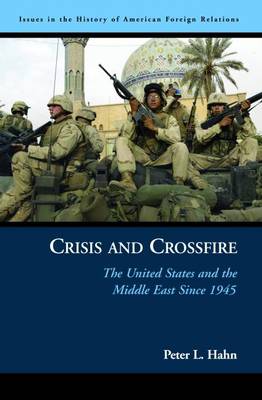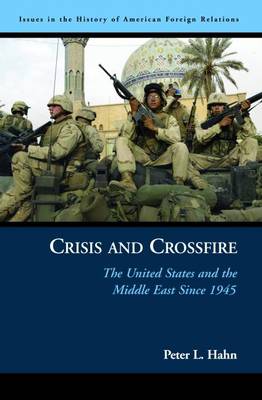
Door een staking bij bpost kan je online bestelling op dit moment iets langer onderweg zijn dan voorzien. Dringend iets nodig? Onze winkels ontvangen jou met open armen!
- Afhalen na 1 uur in een winkel met voorraad
- Gratis thuislevering in België vanaf € 30
- Ruim aanbod met 7 miljoen producten
Door een staking bij bpost kan je online bestelling op dit moment iets langer onderweg zijn dan voorzien. Dringend iets nodig? Onze winkels ontvangen jou met open armen!
- Afhalen na 1 uur in een winkel met voorraad
- Gratis thuislevering in België vanaf € 30
- Ruim aanbod met 7 miljoen producten
Zoeken
€ 34,95
+ 69 punten
Omschrijving
Although it seems almost incredible today, the United States had relatively little interest in the Middle East before 1945. But the dynamics and outcome of World War II elevated the importance of the Middle East in the American mind, and the United States has viewed the region with vital interest to its security and economy ever since. The projection of American power into the region has had consequences that have forever changed the United States and the Middle East, with the rise of al Qaeda and the turbulent occupation of Iraq being the latest examples. Crisis and Crossfire surveys and analyzes the broad contours of U.S. involvement in the region. It probes the reasons why the United States implemented various policies and assesses the wisdom of American leaders as they accepted greater responsibilities for preserving stability and security in the Middle East. Major themes include U.S.-Middle East policy in the context of the Cold War, the rise of Arab and Iranian nationalism, decolonization, the U.S. approach to the Arab-Israeli conflict, the politics of Western dependence on Middle Eastern oil, and America's military interventions, particularly its two wars against Iraq. This book's concise narrative and selection of primary-source documents make it an ideal introduction to U.S.-Middle East relations for students and for anyone with an interest in understanding the history behind today's events.
Specificaties
Betrokkenen
- Auteur(s):
- Uitgeverij:
Inhoud
- Aantal bladzijden:
- 224
- Taal:
- Engels
- Reeks:
Eigenschappen
- Productcode (EAN):
- 9781574888201
- Verschijningsdatum:
- 1/10/2005
- Uitvoering:
- Paperback
- Formaat:
- Trade paperback (VS)
- Afmetingen:
- 152 mm x 226 mm
- Gewicht:
- 362 g

Alleen bij Standaard Boekhandel
+ 69 punten op je klantenkaart van Standaard Boekhandel
Beoordelingen
We publiceren alleen reviews die voldoen aan de voorwaarden voor reviews. Bekijk onze voorwaarden voor reviews.











